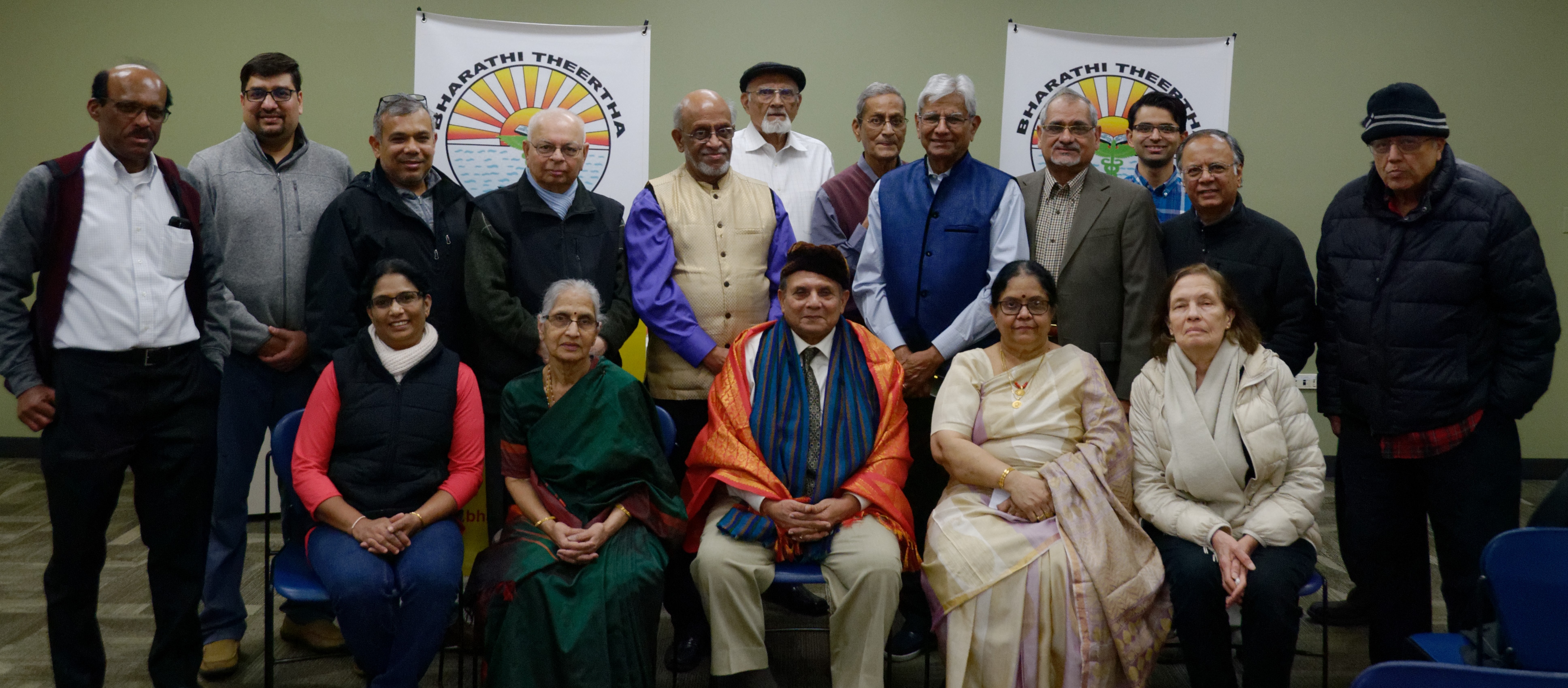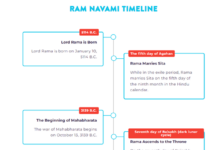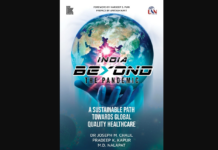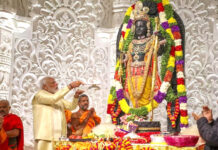Elizabeth Chalier & Sunthar Visuvalingam
CHICAGO: Specialist of comparative theater and classical thought, Sanskritist Bharat Gupt, Executive Trustee at Indira Gandhi National Center for the Arts, New Delhi, gave an hour-long lecture on “Educational Challenges in Modern India in the light of Tradition” at Indian Prairie Public Library, Darien, on December 16.
Co-hosted by Indic Academy (IA), Bridge Builders of Chicago, Sri Annamacharya Project of North America (SAPNA) and Bharathi Theertha (BT), his talk focused on how the Indian Constitution remains the primary obstacle preventing the modern nation from reclaiming its cultural heritage to reaffirm a more authentic civilizational identity.
Contrasting the Western reception and cultivation of ancient Greek and Roman classics,he placed the burden of responsibility for this impasse on the wholly English-educated Jawaharlal Nehru, imposed upon the nation as Prime Minister by founding father Mahatma Gandhi, against the unanimous wishes of the Congress Working Committee.
Gupt made his case by reading out the contradictions inherent in the ‘secular’ Nehruvian Constitution as regards the status and functioning from 1950 of India’s still ‘Macaulayan’ educational system. By forbidding “religious instruction” at any institution (even partially) funded by the State, Section 1 of Article 28 eliminates practically the entire range of consequential classical ‘Hindu’ texts despite the broad, often largely secular, scope of their contents and their human interest.
Creating the category of “minorities,” Article 29 allows the latter to manage their own private institutions, where according to Article 30 anything could be taught, including religious instruction, to protect their language and culture.
By nullifying Article 28 Section 1, Article 30 has allowed Christ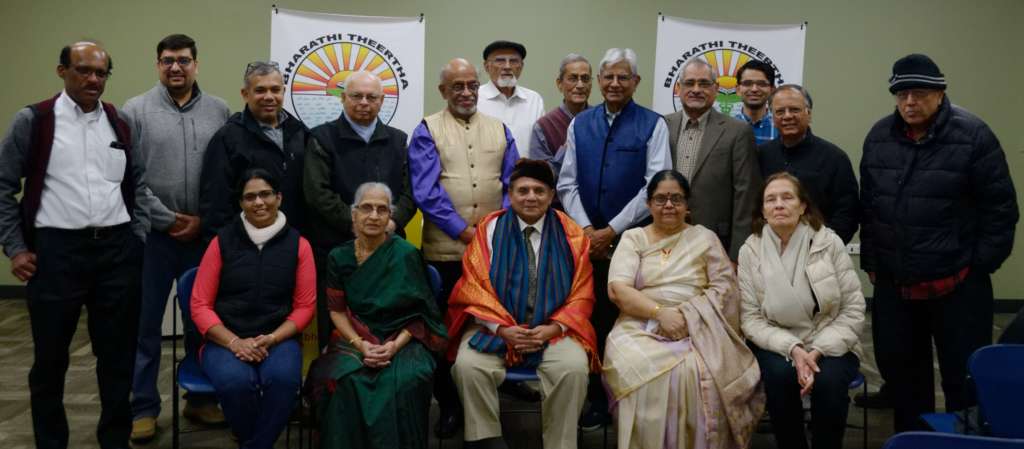 ian schools, for example, to not only shape their own syllabi but include obligatory Bible services, even at premier institutions of higher learning such as St. Stephens, his alma mater in Delhi, frequented by students of other faiths.Nehru’s “double prejudice” for Western and against Hindu classics, was compounded with his further wanting to appease the huge Muslim minority, immediately after Partition, by excepting Islam.
ian schools, for example, to not only shape their own syllabi but include obligatory Bible services, even at premier institutions of higher learning such as St. Stephens, his alma mater in Delhi, frequented by students of other faiths.Nehru’s “double prejudice” for Western and against Hindu classics, was compounded with his further wanting to appease the huge Muslim minority, immediately after Partition, by excepting Islam.
Latin & Greek in West
The 15th C European Renaissance was made possible by the discovery, study and assimilation of Roman and Greek texts, starting with Homer’s epics. The fact that these “classics” were often part and parcel of that very ‘heathen’ religion that Christendom had itself so systematically destroyed, hardly dampened the generalized appreciation of their aesthetics, ethics, philosophy and intrinsic values. Well into the last century, Latin and Greek had remained compulsory for the humanities in many Western universities.
With India’s triumphant intervention in the 1971 Bangladesh war with solid backing from the Soviet Union, Indira Gandhi’s political alliance with the Indian Left led to the appointment of Nurul Hasan as education minister. Key positions were systematically filled with ideologically committed Marxists, who perceived millennial Hindu culture as the fossilized “feudal” relic of a hierarchical (caste-) society.
Anglophone elite
What began as studied indifference had by now become a veritable hatred to a “reactionary” past. Gupt, who started teaching English at Delhi University—also from 1971—and has retired after 40 years, recounted his own academic ordeal as a victim of the paradoxical prejudice of this newly minted Anglophone elite. Despite grounding in Greek and ample invitations to lecture in humanities at faculties abroad, he was denied full professorship and the opportunity to become head of department to authoritatively mentor a wider circle of students, simply on account of being a visibly proud and ardent Sanskritist.
The stewarding of the subcontinent’s ancient heritage has been instead ‘outsourced’ to Western Indologists, who have begun to intervene powerfully in the reinterpretation of its classical past—which had remained mostly beyond the competence of the ideologically-alienated home-grown Marxists—and are now providing the precious ammunition to dismantle its perennial claims from within. Having discovered Wendy Doniger’s latest treatise titled Against Dharma on his May visit here, Gupt singled out University of Chicago as a prime culprit in this politicized demeaning of Indian civilizational identity.
Recounting his own face-to-face apprenticeship with traditional teachers, especially through lifelong engagement with classical music (surbahar) and the arts (theater), Gupt emphasized the universal and continuing validity of their pedagogy that could still be revived and adapted. Precisely what he has been doing through workshops across India and now for Diaspora audiences across North America supported—independently of the university system—by the IA networking infrastructure.
Taking to task the current ‘Hindutva’ political dispensation for having failed to live up over the last four years to the promise of cultural renaissance, Gupt pleaded to (re-) integrate ‘religious’ instruction in public education through reciprocal study of foundational Islamic, Christian, etc., texts, alongside those of the Hindus, for the sake of nation-building and self-reclamation in the multi-confessional Republic.
Gupt, who responded to probing questions from Bridge Builders, was ceremoniously felicitated by SAPNA co-founders, Saradapurna Sonty and Sriram Sonty and BT president Prakasam Tata.
Video recording of Gupt’s talk followed by Q&A is accessible here

